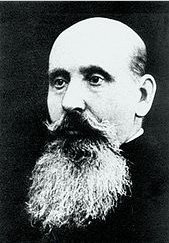Credit for founding solidarism is sometimes given to Father
Heinrich Pesch, S.J. (1854-1926). In
light of the work of Émile Durkheim, however, it is evident that Pesch should, instead,
be regarded as its redeemer. His thought
was directly opposed to that embodied in Das
Katholisch-Soziale Manifest, which (according to Alfred Diamant, 1917-2012)
was intended primarily to reconcile socialism with Catholic social teaching. (Ibid.)
 |
| Wish this guy had another photo. |
Judging from similarities in language, Pesch began with
Durkheim’s theories, in which, admittedly, there are some useful concepts. He would necessarily have believed, however,
that Durkheim’s opinions of both religion and of the human person, whether the
latter is considered as an individual or as a member of society, to be directly
at odds with the teachings of the Catholic Church.
Durkheim’s system embodied an overtly statist orientation
and posited the abolition of the natural law. Pesch evidently adapted Durkheim’s faith-based
concepts to Catholic thought and brought them into conformity with the rational
principles of Aristotelian Thomism. In
this way Pesch transformed solidarism from a liberal collectivist positivist
philosophy, into a natural law, person centered system, avoiding the opposite
extreme of conservative individualist idealism. (Richard E. Mulcahy, S.J., The
Economics of Heinrich Pesch. New York: Henry Holt and Company, 1952, 6.)
 |
| Do we really have to explain? |
Pesch's way agreed with Leo XIII that individual ethics and social
ethics are both true, and are true in the same way. He also assumed as a given that the
collective cannot have any rights that are not delegated from the individuals
who come together to form organized groups; the collective is a human creation,
the State is made for man, not man for the State, as Durkheim had it.
